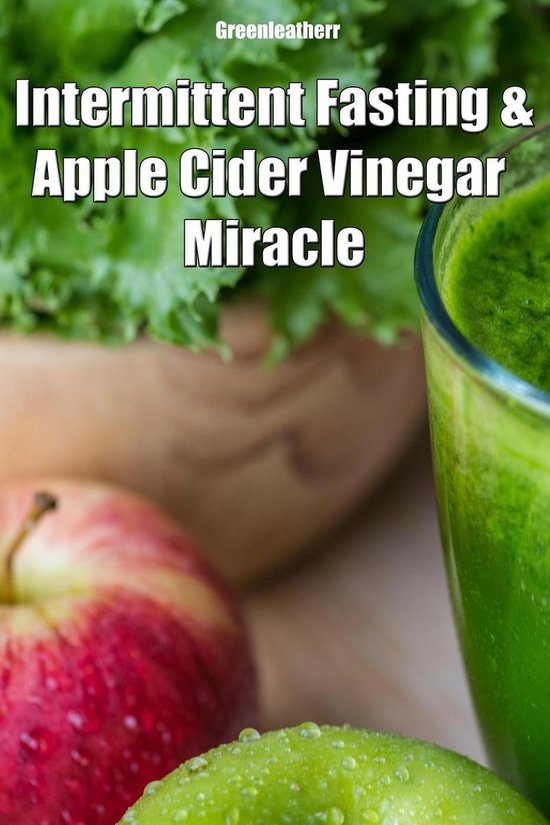Intermittent Fasting With Apple Cider Vinegar

The morning sun streams through the kitchen window, illuminating dust motes dancing in the air. Sarah, a busy mother of two, pours herself a glass of water. With a practiced hand, she adds a tablespoon of apple cider vinegar, the tangy aroma a familiar comfort as she begins her intermittent fasting window. It's a ritual she’s come to cherish, a small act of self-care amidst the daily whirlwind.
This isn't just a fleeting wellness trend; it’s a growing movement. Combining intermittent fasting (IF) with apple cider vinegar (ACV) is gaining traction as a potential way to enhance weight management, improve blood sugar control, and boost overall well-being. But what's the science behind this pairing, and is it right for everyone?
The Rise of Intermittent Fasting
Intermittent fasting isn't a diet; it’s more of an eating pattern. It cycles between periods of eating and voluntary fasting on a regular schedule.
There are several popular methods, including the 16/8 method (fasting for 16 hours and eating within an 8-hour window), the 5:2 diet (eating normally for five days and restricting calories for two), and alternate-day fasting.
Historically, fasting has been practiced for spiritual and health reasons for centuries, predating modern dietary fads. The current resurgence in popularity stems from research highlighting its potential benefits.
Studies, such as those published in the New England Journal of Medicine, have suggested IF may contribute to weight loss, improved insulin sensitivity, and even cellular repair. However, more long-term research is needed to fully understand its effects.
Apple Cider Vinegar: More Than Just a Salad Dressing
Apple cider vinegar, or ACV, is made from fermented apple juice. The fermentation process creates acetic acid, which is believed to be responsible for many of ACV's purported health benefits.
It’s been used for centuries as a traditional remedy for various ailments. From digestive issues to skin conditions, ACV has a long history of anecdotal use.
Research suggests that ACV might help with blood sugar control. A study published in the Journal of Functional Foods found that consuming ACV before meals could improve insulin sensitivity in individuals with type 2 diabetes. However, these findings require further investigation.
Some studies also indicate that ACV may promote satiety and reduce appetite, which could aid in weight management. Although, it’s important to remember that ACV is not a magic bullet and should be used in conjunction with a healthy diet and lifestyle.
The Synergy of IF and ACV
The combination of intermittent fasting and apple cider vinegar is based on the idea that they can synergistically enhance each other’s benefits.
The theory is that ACV's potential to stabilize blood sugar and reduce appetite could make fasting periods more manageable. This may help individuals stick to their fasting schedule and avoid intense cravings.
Furthermore, both IF and ACV have been linked to improved insulin sensitivity, suggesting a potentially additive effect on metabolic health.
However, it’s crucial to note that scientific evidence specifically examining the combined effects of IF and ACV is still limited. Most of the support for this combination is based on the individual benefits of each practice.
Incorporating ACV into Your IF Routine
If you’re considering incorporating ACV into your intermittent fasting routine, it’s important to do so safely and responsibly.
A common recommendation is to dilute one to two tablespoons of ACV in a large glass of water and consume it before meals, or during the fasting window if tolerated.
It’s essential to dilute ACV because its acidity can erode tooth enamel and irritate the esophagus. Drinking it straight is not recommended.
Start with a small amount and gradually increase it to assess your tolerance. Some people may experience nausea or indigestion from ACV, so listen to your body.
It’s also crucial to consult with a healthcare professional before starting any new dietary regimen, especially if you have underlying health conditions or are taking medications. This is particularly important for individuals with diabetes, as ACV can affect blood sugar levels.
Potential Benefits and Risks
While the combination of intermittent fasting and apple cider vinegar shows promise, it's essential to be aware of both the potential benefits and risks.
Potential benefits may include enhanced weight loss, improved blood sugar control, reduced appetite, and improved insulin sensitivity. However, these are largely based on the individual benefits of each practice.
Risks may include tooth enamel erosion, esophageal irritation, nausea, indigestion, and potential interactions with medications. Additionally, IF is not suitable for everyone. Pregnant or breastfeeding women, individuals with a history of eating disorders, and those with certain medical conditions should avoid IF.
Remember, sustainable lifestyle changes are more effective than quick fixes. Focus on a balanced diet, regular exercise, and stress management in addition to IF and ACV.
The Importance of a Holistic Approach
Ultimately, the key to long-term health and well-being lies in a holistic approach. This means addressing various aspects of your lifestyle, including diet, exercise, sleep, and stress management.
Intermittent fasting and apple cider vinegar can be valuable tools, but they are not a substitute for a healthy lifestyle.
Focus on nourishing your body with whole, unprocessed foods. Engage in regular physical activity that you enjoy. Prioritize sleep and find healthy ways to manage stress.
By adopting a holistic approach, you can create a foundation for lasting health and well-being. Remember to consult with healthcare professionals for personalized guidance and support.
Conclusion
The rising popularity of combining intermittent fasting with apple cider vinegar reflects a growing interest in natural and holistic approaches to health. While the science is still evolving, the individual benefits of IF and ACV offer a glimpse into their potential synergystic effects.
Sarah, continuing her morning ritual, feels empowered by her choices. She recognizes that IF and ACV are just part of a larger picture. A picture that includes mindful eating, regular movement, and a deep connection to her own well-being.
It's not about chasing the latest trend. It's about finding what works best for you and nurturing a sustainable path to a healthier, happier life. Listen to your body, seek guidance from professionals, and embrace the journey with patience and self-compassion.


![Intermittent Fasting With Apple Cider Vinegar Apple Cider Vinegar and Intermittent Fasting [Exactly How To Use It]](https://static.wixstatic.com/media/175885_92b2bf960cd2435499ede5453c33d213~mv2.png/v1/fill/w_980,h_1470,al_c,q_90,usm_0.66_1.00_0.01,enc_avif,quality_auto/175885_92b2bf960cd2435499ede5453c33d213~mv2.png)















